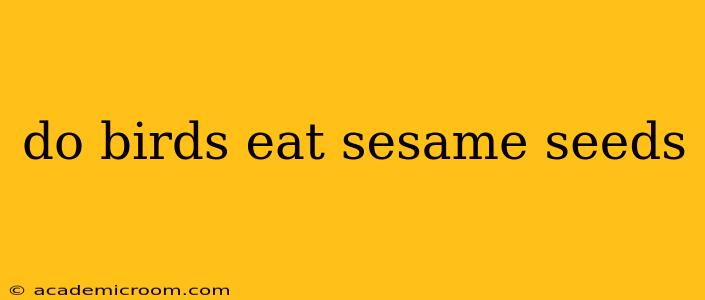Do Birds Eat Sesame Seeds? A Comprehensive Guide
Many backyard bird enthusiasts wonder if sesame seeds are a safe and nutritious addition to their feathered friends' diets. The short answer is: yes, birds can eat sesame seeds, but with some important caveats. While not a primary food source, sesame seeds can offer supplemental nutrition and variety. This article will delve deeper into the topic, answering common questions and providing valuable insights for bird lovers.
What types of birds eat sesame seeds?
Several bird species enjoy sesame seeds, particularly those with strong beaks capable of cracking the seeds' hard shells. Ground-feeding birds like sparrows, juncos, and doves often readily consume scattered seeds. Smaller birds may struggle with the larger seeds, while larger birds may only consume them occasionally. Finches, for example, are known to appreciate sesame seeds as part of a mixed seed blend. However, it's important to remember that sesame seeds shouldn't form the majority of a bird's diet.
Are sesame seeds good for birds?
Sesame seeds offer some nutritional benefits for birds. They are a good source of:
- Fat: Providing energy for flight and activity.
- Protein: Essential for muscle growth and repair.
- Minerals: Such as calcium, iron, and magnesium, which contribute to overall health.
However, sesame seeds should be offered in moderation. A diet overly reliant on sesame seeds could lead to nutritional imbalances. It's crucial to provide a varied diet that includes a blend of seeds, nuts, fruits, and insects, depending on the species of bird you're feeding.
Are there any risks associated with feeding birds sesame seeds?
While generally safe, there are a few potential risks associated with feeding birds sesame seeds:
- Choking Hazard: Whole sesame seeds can pose a choking hazard to smaller birds. Consider crushing or grinding the seeds before offering them, particularly to smaller species.
- Allergic Reactions: Though rare, some birds may have allergic reactions to sesame seeds. Monitor your birds for any signs of distress after consuming sesame seeds, such as respiratory issues or digestive problems.
- Nutritional Imbalance: Over-reliance on sesame seeds can lead to nutritional deficiencies if not part of a balanced diet. Provide a diverse range of foods to ensure your birds receive all the nutrients they need.
Can I feed my pet bird sesame seeds?
Whether or not you should feed your pet bird sesame seeds depends on the species and their specific dietary needs. Always consult with an avian veterinarian or an expert in bird nutrition before introducing new foods to your pet's diet. They can advise on appropriate amounts and ensure the seeds are a suitable addition to your pet's already balanced diet. Improper nutrition can lead to severe health problems for your pet bird.
Where can I buy sesame seeds for birds?
Sesame seeds are readily available at most grocery stores, health food stores, and online retailers. Ensure you purchase high-quality, unprocessed seeds. Avoid seeds that have been treated with pesticides or other harmful chemicals.
How much sesame seed should I give birds?
There is no set amount of sesame seeds to give birds. It's best to offer them in small quantities as a supplementary food, rather than a staple. Observe your birds' eating habits and adjust the quantity accordingly. Always provide a diverse range of food sources to ensure a balanced and healthy diet.
By understanding the nutritional value and potential risks associated with feeding birds sesame seeds, bird enthusiasts can make informed decisions that promote the health and well-being of their feathered friends. Remember, moderation and a balanced diet are key to ensuring your birds thrive.
